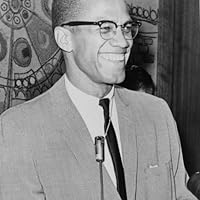Militancy Quotes
Quotes tagged as "militancy"
Showing 1-10 of 10

“Be peaceful, be courteous, obey the law, respect everyone; but if someone puts his hand on you, send him to the cemetery.”
―
―

“When you are caught between military and militants, there is no good”
― I Am Malala: How One Girl Stood Up for Education and Changed the World
― I Am Malala: How One Girl Stood Up for Education and Changed the World
“We must clean our national psyche from all manifestation of evil, be it kidnapping, militancy, insurgency, murders or assassinations.”
―
―
“Is it possible to be militant about creativity and care? Can militancy be based on something that is responsive and relationship-based? Can people be militant about joy?”
― Joyful Militancy: Building Thriving Resistance in Toxic Times
― Joyful Militancy: Building Thriving Resistance in Toxic Times

“Over the next seven years, the group [Weather Underground] claimed credit for more than two dozen bombings of high-profile targets such as the Pentagon, numerous courthouses and police stations, the U.S. Agency for International Development, and several corporations involved in the coup in Chile or colonialism in Angola. Weather articulated a politics of solidarity that demanded a high level of sacrifice by whites in support of Black and other revolutionary people of color. This support emanated from a strategic belief, pioneered by Che Guevara, that U.S. imperialism could be defeated through overextension; bombings were an attempt to pierce the myth of government invincibility and draw repressive attention away from the Panthers and similar groups. It also reflected a political position that said white people had to side with Third World struggles against the U.S. government—and had to do so in a similarly dramatic way.”
― The Struggle Within: Prisons, Political Prisoners, and Mass Movements in the United States
― The Struggle Within: Prisons, Political Prisoners, and Mass Movements in the United States

“I am frightened of escalation. I remember how it seduces and blinds. I remember how to incite it. I remember that I once believed there was nothing left for us to do but make things worse. On purpose.”
― Swords in the Hands of Children: Reflections of an American Revolutionary
― Swords in the Hands of Children: Reflections of an American Revolutionary

“I was asked to do a lot of things by the Weather Underground leadership over the years and, toward the end, asked to do many things I didn’t even believe at the time were right, but I did them anyway. I let my friends talk me into doing them. Those acts mainly amounted to lying to people, rather than potentially injuring them. When I finally quit it was not just because I realized that the vision was unconnected to reality. Even then, as ever, I was acting more from emotion than ideology. Mostly I was angry at having been manipulated, and humiliated for allowing myself to be manipulated, and mortified at then manipulating others in turn. But no one ever asked me to carry out a bombing. Grown-up me wants to think that even if they had, as late in the process, say, as the moment when dressed in the bland costume of an office worker I had been handed the attaché case containing the ticking device, I would have hesitated, considered the implications, and declined to go through with it. But I was still a child during those years, who needed to tag along after the big boys, take their dare, win their approval. Yes, almost certainly, I would have done it.”
― Swords in the Hands of Children: Reflections of an American Revolutionary
― Swords in the Hands of Children: Reflections of an American Revolutionary

“for the strength of a man and the softness of a woman, the institution of family, and the difference citation of occupation are mere militant necessities of an age of physical force.”
― The Time Machine
― The Time Machine

“One of the most disturbing experiences I've had in my life has been to realize, again and again over the years, how impossible it is to speak to the heart, to the deep conscience of individuals who have exchanged their genuine personality for a group or ideological stereotype. [...] In the beginning, it's not really an exchange. The stereotype is adopted as a covering, a sign of identity, a password that facilitates the subject's integration into a social group and, by freeing them from their isolation, makes them feel even more human. Then the progressive identification with the group's values and objectives replaces direct perceptions and initial feelings with a schematic imitation of the group's behavior and mental traits, until concrete individuality, with all its irreducible mystery, disappears under the mask of collective identity. [...] The desensitization of the deep conscience corresponds, by contrast, to a hypersensitization of the surface, a fake susceptibility, a predisposition to feel offended or threatened by any little thing that opposes the will of the group.”
― O Mínimo que Você Precisa Saber Para Não Ser um Idiota
― O Mínimo que Você Precisa Saber Para Não Ser um Idiota
All Quotes
|
My Quotes
|
Add A Quote
Browse By Tag
- Love Quotes 97k
- Life Quotes 75.5k
- Inspirational Quotes 72.5k
- Humor Quotes 43.5k
- Philosophy Quotes 29.5k
- Inspirational Quotes Quotes 27k
- God Quotes 26k
- Truth Quotes 23.5k
- Wisdom Quotes 23.5k
- Romance Quotes 23k
- Poetry Quotes 22k
- Death Quotes 20k
- Happiness Quotes 18.5k
- Life Lessons Quotes 18.5k
- Hope Quotes 18k
- Faith Quotes 18k
- Quotes Quotes 16.5k
- Inspiration Quotes 16.5k
- Spirituality Quotes 15k
- Religion Quotes 15k
- Motivational Quotes 15k
- Writing Quotes 14.5k
- Relationships Quotes 14.5k
- Life Quotes Quotes 14k
- Love Quotes Quotes 13.5k
- Success Quotes 13.5k
- Time Quotes 12.5k
- Motivation Quotes 12k
- Science Quotes 11.5k
- Knowledge Quotes 11k

